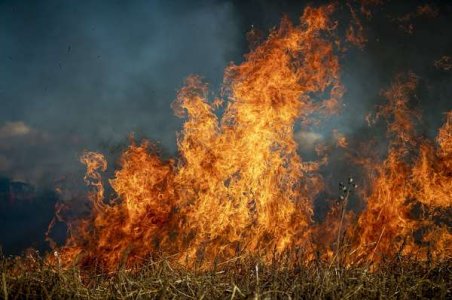Fight fire with facts–Essential wildfire smoke safety tips that you should know
- Replies 0
As wildfires continue to blaze across various regions, the smoke produced can pose serious health risks to you, your family, and your furry companions.
The air quality deteriorates rapidly, and the fine particles in the smoke can infiltrate our homes and lungs, leading to a myriad of health issues.
To avoid this, let's explore some essential safety tips to protect yourself and your family from the dangers of wildfire smoke.
Wildfire smoke is a complex mixture of gases and fine particles produced when wood and other organic materials burn.
These microscopic particles can penetrate deep into your lungs, causing a range of health problems from burning eyes and a runny nose to more serious conditions such as chronic heart and lung diseases.
Exposure to smoke can exacerbate conditions like asthma, lead to irregular heartbeats, and even increase the risk of heart attacks in susceptible individuals.
"Predicting where ash or soot from a fire will travel, or how winds will impact air quality, is difficult, so it's important for everyone to stay aware of the air quality in your area, make plans, and take action to protect your health and your family's health," Los Angeles County Health Officer Muntu Davis stated in a news release.

Stay indoors and reduce physical exertion
When smoke is visible or can be smelled, it's best to stay indoors and limit outdoor activities.
This is especially important for high-risk groups such as children, pregnant individuals, older adults, and those with pre-existing conditions like asthma or heart and lung diseases.
Even if you can't see or smell smoke, it's wise for these groups to remain inside.
Schools and recreational programs should take heed by limiting outdoor time for children and canceling outdoor sports practices and physical education classes. If smoke is visible, these precautions should also apply to indoor activities.
Improve indoor air quality
To keep your indoor air as clean as possible, close windows and doors to prevent smoky air from entering.
Use HEPA air purifiers to filter out particulate matter, and if you have air conditioning, ensure it's set to recirculate indoor air rather than drawing in air from outside.
Regularly check and replace air filters, opting for MERV 13 or higher filters, which are more effective against smoke particles.
If commercial air purifiers are not within reach, consider building a DIY air filter, such as the Corsi-Rosenthal box, using a box fan, an air filter, and duct tape.
Source: National Weather Service (NWS) / Youtube.
Create a “clean room”
The American Lung Association suggests setting up a “clean room” in your home where the risk of wildfire smoke is high. This room should be free from activities that generate particles, such as cooking or smoking.
Keep doors closed to prevent smoke from entering, and use a portable air cleaner to maintain cleaner air than in the rest of your home.
Avoid activities that worsen indoor air quality
During times of poor air quality, refrain from using fireplaces, candles, and vacuums, and avoid smoking indoors.
These activities can contribute to indoor air pollution and exacerbate the effects of outdoor smoke.
Protect yourself if you must go outside
If going outside is unavoidable, wear a high-quality, well-fitting N95 or P100 respirator mask to filter out harmful particles. Keep outdoor activities to a minimum and avoid strenuous physical exertion.
Safeguarding your pets
Our pets are also vulnerable to the effects of smoke. Keep them indoors as much as possible and limit their outdoor activities.
Watch for signs of distress, such as red or watery eyes, a watery nose, coughing, gagging, or an elevated respiratory rate when not active. If these symptoms persist, consult a veterinarian.
Remember, the elderly and very young pets, as well as those with pre-existing conditions, are most at risk. Certain breeds may also be more susceptible to respiratory issues.

Have you been affected by wildfire smoke? Do you have additional tips or experiences to share? Share your insights in the comments below!
The air quality deteriorates rapidly, and the fine particles in the smoke can infiltrate our homes and lungs, leading to a myriad of health issues.
To avoid this, let's explore some essential safety tips to protect yourself and your family from the dangers of wildfire smoke.
Wildfire smoke is a complex mixture of gases and fine particles produced when wood and other organic materials burn.
These microscopic particles can penetrate deep into your lungs, causing a range of health problems from burning eyes and a runny nose to more serious conditions such as chronic heart and lung diseases.
Exposure to smoke can exacerbate conditions like asthma, lead to irregular heartbeats, and even increase the risk of heart attacks in susceptible individuals.
"Predicting where ash or soot from a fire will travel, or how winds will impact air quality, is difficult, so it's important for everyone to stay aware of the air quality in your area, make plans, and take action to protect your health and your family's health," Los Angeles County Health Officer Muntu Davis stated in a news release.

Wildfires in Los Angeles County have led to surrounding air being filled with smoke that is unhealthy to breathe. Image source: Matthias Fischer / Pixabay.
Stay indoors and reduce physical exertion
When smoke is visible or can be smelled, it's best to stay indoors and limit outdoor activities.
This is especially important for high-risk groups such as children, pregnant individuals, older adults, and those with pre-existing conditions like asthma or heart and lung diseases.
Even if you can't see or smell smoke, it's wise for these groups to remain inside.
Schools and recreational programs should take heed by limiting outdoor time for children and canceling outdoor sports practices and physical education classes. If smoke is visible, these precautions should also apply to indoor activities.
Improve indoor air quality
To keep your indoor air as clean as possible, close windows and doors to prevent smoky air from entering.
Use HEPA air purifiers to filter out particulate matter, and if you have air conditioning, ensure it's set to recirculate indoor air rather than drawing in air from outside.
Regularly check and replace air filters, opting for MERV 13 or higher filters, which are more effective against smoke particles.
If commercial air purifiers are not within reach, consider building a DIY air filter, such as the Corsi-Rosenthal box, using a box fan, an air filter, and duct tape.
Source: National Weather Service (NWS) / Youtube.
Create a “clean room”
The American Lung Association suggests setting up a “clean room” in your home where the risk of wildfire smoke is high. This room should be free from activities that generate particles, such as cooking or smoking.
Keep doors closed to prevent smoke from entering, and use a portable air cleaner to maintain cleaner air than in the rest of your home.
Avoid activities that worsen indoor air quality
During times of poor air quality, refrain from using fireplaces, candles, and vacuums, and avoid smoking indoors.
These activities can contribute to indoor air pollution and exacerbate the effects of outdoor smoke.
Protect yourself if you must go outside
If going outside is unavoidable, wear a high-quality, well-fitting N95 or P100 respirator mask to filter out harmful particles. Keep outdoor activities to a minimum and avoid strenuous physical exertion.
Safeguarding your pets
Our pets are also vulnerable to the effects of smoke. Keep them indoors as much as possible and limit their outdoor activities.
Watch for signs of distress, such as red or watery eyes, a watery nose, coughing, gagging, or an elevated respiratory rate when not active. If these symptoms persist, consult a veterinarian.
Remember, the elderly and very young pets, as well as those with pre-existing conditions, are most at risk. Certain breeds may also be more susceptible to respiratory issues.
Key Takeaways
- Wildfires in Los Angeles County have led to surrounding air being filled with smoke that is unhealthy to breathe.
- The Los Angeles County Health Officer stresses the importance of staying aware of air quality and taking action to protect health due to the potential effects of small particles in wildfire smoke.
- Safety measures include staying indoors, using HEPA air purifiers, and creating a 'clean room' in the home to minimise smoke exposure.
- Pets are also at risk from smoky air, and owners should monitor their health closely and limit their outdoor activities.
Have you been affected by wildfire smoke? Do you have additional tips or experiences to share? Share your insights in the comments below!






